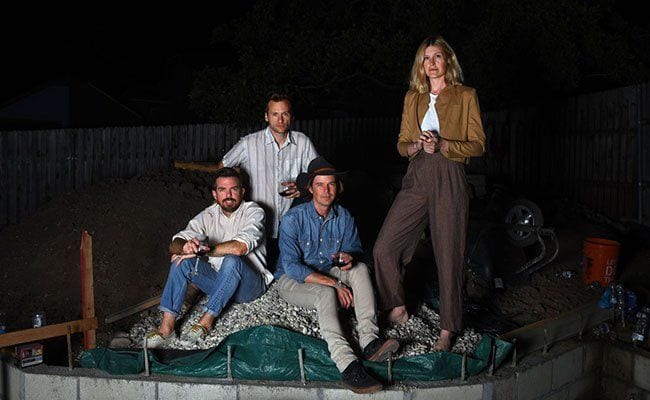
Spear in the City, Bodies of Water’s fourth album, has been a long time coming. Six years have passed since the self-described gospel group’s last album, but the new record shows no signs of rust even though the band’s married co-leaders David and Meredith Metcalf have been dabbling in other styles of music in the interim.
Bodies of Water don’t play traditional gospel, although it’s one element of their sound. Instead, the group sits at the intersection of indie rock and soul, with an emphasis on vocals and atmosphere instead of big guitar riffs. Their lyrics tend towards the spiritual without usually getting specific enough to be explicitly faith-based.
It’s interesting that “Spear in the City” is the album’s slowest, quietest song. It’s also the record’s centerpiece, a notable bit of breathing space among a set of more energetic tracks. It’s essentially a lullaby, with quiet, Spanish-flavored acoustic guitar, barely-there bass, and a mostly just a shaker keeping the beat. The Metcalfs sing together, with Meredith’s high harmony blending nicely with David’s rich baritone. The oblique lyrics, about a flying, nonstop spear smashing through walls, objects, and even people, are typical of the album. There seems to be symbolism there, but for me, it was just out of reach.
The record’s opener “Dark Water” is a better representation of the band’s style. Rich minor key piano chords mesh nicely with the syncopated drumbeat and are eventually joined by a guitar playing an arpeggio, adding color to the already-strong groove. David’s lead vocals are accompanied call-and-response style by a group of chorale-style voices. Lyrically, David describes a great flood that washes away the city and doesn’t stop until it reaches the mountains. “Dark Water” focuses on things that are being lost to the flood, as David lists them off. Schools, churches, parking lots, hospitals, and discotheques all make the list, which is interesting even as it falls short of evocative.
This listing technique resurfaces in “I’m Set Free”, which pairs a low-key shuffle with lyrics about leaving earthly trappings and electronic devices behind. Quiet claves, bongos, and organ all add to the song’s subtle bounce. For the last chunk of the song, David abandons more narrative lyrics to list a bunch of electronic music subgenres simply. So we get “Free from the jungle / Free from the ambient / Free from the Hi-NRG / Free from the house”, and in this song, the list does become evocative simply because it’s so unexpected. It helps that the chorale voices behind him become thicker and richer as the list repeats to the end of the song.
It’s interesting that the fuller Bodies of Water’s arrangements get, the more they resemble Arcade Fire. “Here Among You” is one of the most blatantly spiritual songs on the album, with lyrics about a voice from up above bringing The Word to the faithful. It even ends with the refrain, “When the world’s on fire / When it’s ceased to turn / You and I will never burn.” That is all set to a martial drumbeat, a lightly chugging guitar riff, and a squiggly synth line. The voices rise in chorus on the refrain, and portentous low piano notes transition the song from the refrain back to the verses. “Hold Me Closer” has a similar style, with soaring vocals from David, hard-hitting rhythms and choral voices in the refrain. Both songs could easily pass for early Arcade Fire tracks. I don’t think that Bodies of Water are imitating them, though. Instead, I believe they pull from similar sources of inspiration, and it highlights how much, consciously or not, Win Butler and Regine Chassagne took from gospel music in their early days.
The Metcalfs are pretty dedicated to their core sound, but the few times they stretch a bit on Spear in the City, they’re quite successful. “Spear in the City” is the most notable example, but “Heartbeating” and “Echoes” also try different things. “Heartbeating” takes its title seriously, with a heavy, pounding floor tom rhythm driving the whole song. Syncopated claps and buzzing synths add flavor to the song and it doesn’t feel like anything else on the album. “Echoes” puts the synth front and center while still using a relaxed tempo and some prominent electric piano in the verses. This gives it the feel of an early ‘80s pop song in the style of Genesis’ “That’s All”.
Spear in the City is a strong album from start to finish. Bodies of Water find a nice lyrical balance between the spiritual and non-secular, and musically they have a solid songwriting style. This isn’t super-catchy, sugary sweet pop music, but the record’s subtle melodies and hooks keep the songs interesting, regardless if those hooks are coming from a piano, guitar, or a chorus of voices.

